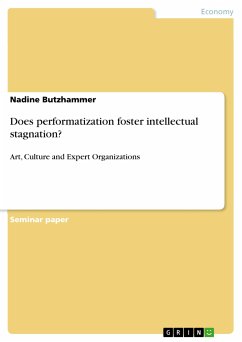
Does performatization foster intellectual stagnation? (eBook, PDF)
Art, Culture and Expert Organizations
Sofort per Download lieferbar
Statt: 17,95 €**
15,99 €
inkl. MwSt. und vom Verlag festgesetzt.
**Preis der gedruckten Ausgabe (Broschiertes Buch)
Alle Infos zum eBook verschenkenWeitere Ausgaben:

PAYBACK Punkte
0 °P sammeln!
Seminar paper from the year 2018 in the subject Business economics - Business Management, Corporate Governance, grade: 1.0, University of Innsbruck, language: English, abstract: "While it may be reasonable to believe that a lack of institutional incentives is detrimental in terms of research productivity, a sophisticated and intrusive system of rewards and surveillance focused on performance measurement may stifle innovation [...]." The above statement by Gendron (2008) raises the question: How much is too much? The present seminar thesis shall explain, in which status of performance thinking ...
Seminar paper from the year 2018 in the subject Business economics - Business Management, Corporate Governance, grade: 1.0, University of Innsbruck, language: English, abstract: "While it may be reasonable to believe that a lack of institutional incentives is detrimental in terms of research productivity, a sophisticated and intrusive system of rewards and surveillance focused on performance measurement may stifle innovation [...]." The above statement by Gendron (2008) raises the question: How much is too much? The present seminar thesis shall explain, in which status of performance thinking accompanied by rewards the higher education sector is situated and which implications follow out of this for research activities of universities in particular. Concretely, the research question "Does performatization foster intellectual stagnation" shall be examined. For this purpose, a literature study has been operated, which encompasses inter alia renowned authors like Alvesson, Gendron, Hopwood, Humphrey, Parker and Sandberg. The seminar thesis is set up as follows: It starts with a brief overview about the presence of performance thinking in academia and its emergence. Thereupon, the actual main part follows which deals with the examination of the consequences triggered by performativity. After limiting the thesis to the university's activity of research and more precisely to the performance indicator of journal rankings in particular, firstly positive consequences and subsequently negative consequences are examined. As a next step, change attempts and resistance against the performativity movement in general and against specific consequences out of it are introduced. In the final discussion chapter, the previous findings are illuminated from different angels and in this course also reflected and brought into wider context. The seminar thesis ends with a short summary of the outcomes and a personal notation of the author.
Dieser Download kann aus rechtlichen Gründen nur mit Rechnungsadresse in A, B, BG, CY, CZ, D, DK, EW, E, FIN, F, GR, HR, H, IRL, I, LT, L, LR, M, NL, PL, P, R, S, SLO, SK ausgeliefert werden.













